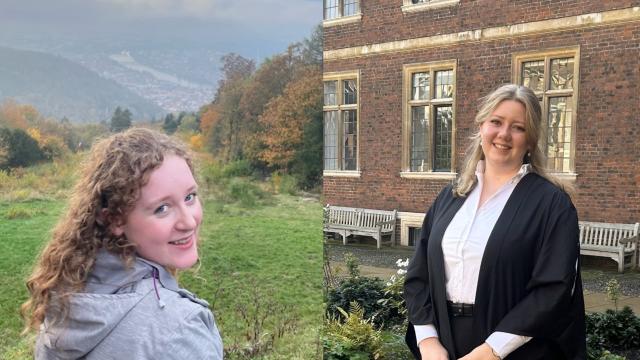
St Catharine’s was delighted to again host the annual welcome event for the latest intake of students to benefit from the University of Cambridge’s Harding Distinguished Postgraduate Scholarship Programme, with an array of presentations and a panel discussion showing the interdisciplinary nature of the programme.
Outstanding PhD students across all disciplines at the University of Cambridge are supported by the programme, thanks to the generosity of our alumnus Sir David Harding (1979, Natural Sciences; Honorary Fellow 2013), through the donation from the David and Claudia Harding Foundation. A significant proportion of Harding Distinguished Postgraduate Scholars are based at St Catharine’s (five each year on average).
Sir John Benger (1979, English; Master 2023) and Vice-Chancellor Professor Deborah Prentice welcomed Sir David Harding and James Holmes, Executive Director of the David and Claudia Harding Foundation, among the special guests at the event in the McGrath Centre at St Catharine’s on 14 October 2024.
Sir John commented, “Sir David and I joined Catz in the same year group and both of us benefited from the connections and friendships that we made during our time here. I was delighted that he could join us for this special event which encourages the newest intake of Harding Scholars to connect with each other and the wider purpose of the Harding Distinguished Postgraduate Scholarship Programme. I hope the presentations and discussions on the day provided food for thought and inspiration as they embark on their PhD research.”
One of the key features of the Harding Distinguished Postgraduate Scholarship Programme is the breadth of study of the scholars. Among the three keynote speakers invited to present at the welcome event was Doudou Cao, a Biological Anthropology PhD student at St Catharine’s and part of the 2021 cohort of Harding Scholars.
Doudou said, “Sharing my work was both exciting and rewarding, and I was truly inspired by the thoughtful insights that the other two student speakers shared from their fields – physics and worms! The audience’s questions and the roundtable discussion also gave me fresh perspectives, not only on my research but also on my overall experience at Cambridge. It reminded me of how fortunate I am to be part of such a diverse and supportive programme.”
Doudou presented her work which is focused on human growth, development and skeletal adaptations in high-altitude environments, particularly among ancient Tibetan populations. By analysing human skeletal remains from archaeological sites across the Tibetan Plateau, she explores how extreme conditions such as hypoxia and cold influenced adaptation and survival strategies over time.
She added, “The welcome event was a great experience. It was great to meet new fellow scholars and feel a strong sense of community. I appreciated the opportunity to connect with everyone – especially seeing Sir David in person.”
The panel discussion, chaired by Professor Sir John Aston, the Pro Vice-Chancellor for Research at the University of Cambridge and Harding Professor of Statistics in Public Life, explained how the students can focus their research in ways that would otherwise be difficult.
He said, “The welcome event was excellent in that it showcased the wide variety of areas that people within the programme work on. Interdisciplinarity is where the most exciting research often takes place. Showing that this is not only possible but encouraged will likely help new students really broaden their horizons, making their own research even more impressive.
“All three presentations were really impressive. They were very diverse, which is really important, yet they showcased how different disciplines coming together yield fascinating research. They were really accessible and generated some excellent discussion. I also think they showed the best aspects of our PhD students in Cambridge which was good for everyone to see.”
Adapted from reporting by University of Cambridge Development and Alumni Relations.






